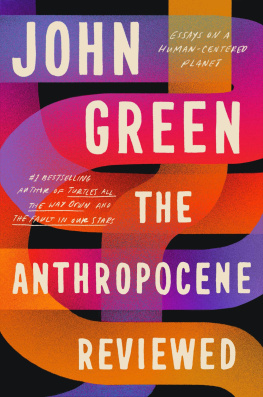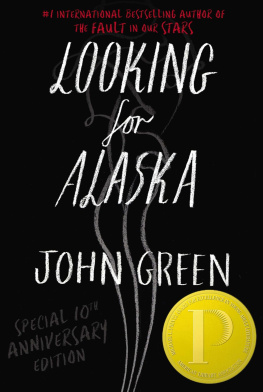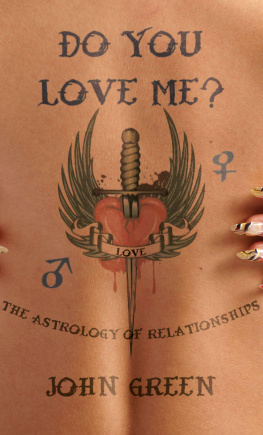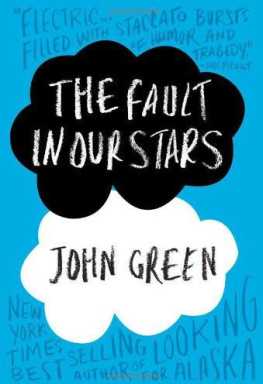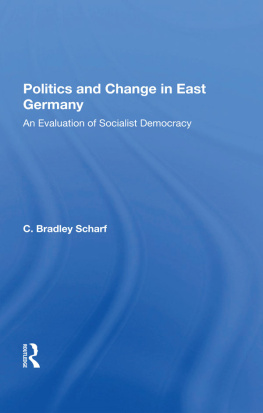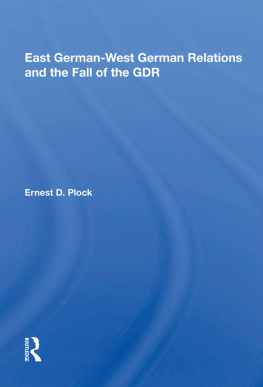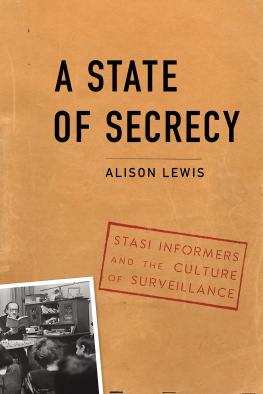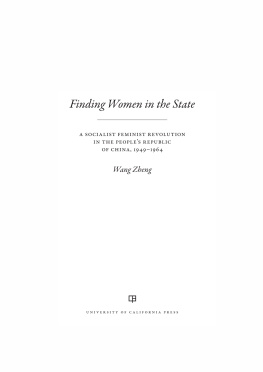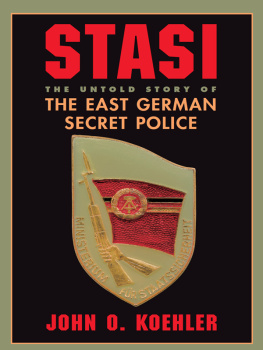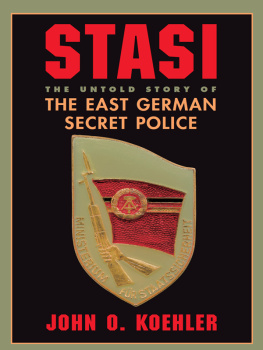John Green - Stasi State or Socialist Paradise?: The German Democratic Republic and What Became of It
Here you can read online John Green - Stasi State or Socialist Paradise?: The German Democratic Republic and What Became of It full text of the book (entire story) in english for free. Download pdf and epub, get meaning, cover and reviews about this ebook. year: 2015, publisher: Artery Publications, genre: Politics. Description of the work, (preface) as well as reviews are available. Best literature library LitArk.com created for fans of good reading and offers a wide selection of genres:
Romance novel
Science fiction
Adventure
Detective
Science
History
Home and family
Prose
Art
Politics
Computer
Non-fiction
Religion
Business
Children
Humor
Choose a favorite category and find really read worthwhile books. Enjoy immersion in the world of imagination, feel the emotions of the characters or learn something new for yourself, make an fascinating discovery.
- Book:Stasi State or Socialist Paradise?: The German Democratic Republic and What Became of It
- Author:
- Publisher:Artery Publications
- Genre:
- Year:2015
- Rating:5 / 5
- Favourites:Add to favourites
- Your mark:
- 100
- 1
- 2
- 3
- 4
- 5
Stasi State or Socialist Paradise?: The German Democratic Republic and What Became of It: summary, description and annotation
We offer to read an annotation, description, summary or preface (depends on what the author of the book "Stasi State or Socialist Paradise?: The German Democratic Republic and What Became of It" wrote himself). If you haven't found the necessary information about the book — write in the comments, we will try to find it.
Stasi State or Socialist Paradise?: The German Democratic Republic and What Became of It — read online for free the complete book (whole text) full work
Below is the text of the book, divided by pages. System saving the place of the last page read, allows you to conveniently read the book "Stasi State or Socialist Paradise?: The German Democratic Republic and What Became of It" online for free, without having to search again every time where you left off. Put a bookmark, and you can go to the page where you finished reading at any time.
Font size:
Interval:
Bookmark:
Stasi State or Workers Paradise socialism in the German Democratic Republic and what became of it
by Bruni de la Motte & John Green
First published in Britain in 2015
Copyright John Green & Bruni de la Motte
Designed by Michal Boncza
Printed by
ACIP catalogue record for this book is available from the British Library
ISBN 978-0-9558228-6-5
Artery Publications, 11 Dorset Road, London W5 4HU
Contents
Introduction
A difficult birth - how the GDR came about
A more egalitarian society
Social ethos the community spirit
Equal rights for women
Childcare
Young people
Social wage
Voluntary work
Education
A comprehensive system for all age groups
The polytechnic principle
Economy
Workers rights
Pros and cons of central planning
Farming and Co-operatives
Public transport
Health service
Culture, media and sport
Freedom and democracy
Justice and legal rights
Religious freedom
The state security services
Internationalism and foreign aid
The demise of the GDR
The fall of the Wall
Currency union
The Treuhand and the asset-stripping process
The so-called old debts
The decapitation of the GDRs intellectual workforce
Housing vultures
Women the biggest losers
East Germans treated worse than the Nazis
Conclusion
Notes
Bibliography
Foreword
History is famously written by the victors. Nowhere is that more obvious than in the former communist states of central and eastern Europe. Their successor governments have systematically sought to demonise or even punish any attempt to recognise the social and economic achievements of east European-style socialism, alongside its constantly rehearsed failures and injustices.
The more their citizens balk at such a one-sided account of their own lived experiences, the more any honest or remotely sympathetic discussion of the experience of post-war European communism is met with official denunciation and legal bans, from Hungary to Ukraine.
In the case of the former German Democratic Republic, the drive to brand it an illegitimate state of injustice and deny the existence of any redeeming features has become a test of loyalty in todays Federal Republic. The great merit of Bruni de la Motte and John Greens book is that, far from whitewashing the east German experience, it offers a sober and balanced assessment - neither exaggerating its successes nor downplaying its failings.
The GDR was home to the Stasi, shortages and the Berlin wall. But it was also a country of full employment, social and womens equality well ahead of its time, cheap housing, transport and culture, one of the best childcare systems in the world, and greater freedom in the workplace than most employees enjoy in todays Germany.
Along with the humiliation of West Germanys takeover, thats why Der Spiegel found in 2009 that 57 per cent of eastern Germans believed the GDR had more good sides than bad sides, and even younger people rejected the idea that the state had been a dictatorship. Similar public disenchantment with the post-1989 experience can be found in polling results across eastern Europe and the former Soviet Union.
For Germans, of course, the destruction of the wall didnt only signal the end of authoritarian rule and travel restrictions in the east, competitive elections and better consumer goods, as elsewhere in the former eastern bloc. It also meant an end to the militarised division of families, their capital city and an entire nation. So they had more reason to celebrate than most.
But the question in 1989 wasnt whether the old system had to change - it was how it would change. The political force that had turned the Soviet Union into a superpower, industrialised half of Europe and sent the first human being into space had exhausted itself. There were, however, alternative routes out of its crisis.
What the protesters in first Gdansk and then Leipzig were mostly demanding was not capitalism, but a different kind of socialism. Even given a restoration of capitalism, there were softer landings that could have been negotiated between the main Cold War powers.
Instead, 1989 unleashed across the region and then the former Soviet Union free-market shock therapy, commercial robbery dressed up as privatisation, vast increases in inequality, and poverty and joblessness for tens of millions. Reunification in Germany meant annexation, the takeover and closure of most of its industry, a political purge of more than a million teachers and other white-collar workers, a loss of womens rights, closure of free nurseries and mass unemployment still almost double western Germanys rate after a quarter of a century.
And east Germany has done far better than the rest. Elsewhere in eastern Europe, the crisis created under western tutelage was comparable to the Great Depression in the US, and national income took more than a decade to recover. In Russia itself, post-communist catastroika produced the greatest peacetime economic collapse in modern history.
The western failure to recognise the shocking price paid by many east Europeans for a highly qualified freedom the Economist contemptuously dismissed them as the old, the timid, the dim is only exceeded by the refusal to acknowledge that the communist system had benefits as well as obvious costs.
This two-sided nature of 1989 is also reflected in its global and ideological impact. It kicked off the process that led to the end of the Cold War. But by removing the worlds only other superpower from the global stage, it also destroyed the constraints on US global power and paved the way for wars from the Gulf and Yugoslavia to Iraq and Afghanistan.
At the same time, by destroying its main ideological competitor, 1989 opened the door to a deregulated model of capitalism that has wreaked social and economic havoc across the world. That, in turn, led to the economic crash of 2008, which discredited - but has far from sunk - that neoliberal model. But it also created the conditions for the wave of progressive change in Latin America that has challenged the post-89 social order and raised the possibility of a new form of socialism for the 21st century.
Its often said that the collapse of European communism and the Soviet Union has destroyed the only systemic alternative to capitalism. But the pressure for a social alternative has always come from capitalism itself and its failures, which are once again increasingly obvious to people throughout the world.
The system that collapsed a generation ago is history. But, as new movements and models emerge to challenge a global order beset by ecological and economic crisis, its crucial to learn the lessons of both its successes and failures. By laying out the experience of 40 years of the GDR, which they describe as having been one of the most egalitarian society in Europe, Bruni de la Motte and John Green have performed a valuable service for the future.
Seumas Milne
The truth, is so often the reverse of what has been told us by our culture that we cannot turn our heads far enough around to see it.
US historian Howard Zinn
The economic anarchy of capitalist society as it exists today is, in my opinion, the real source of the evil. We see before us a huge community of producers the members of which are unceasingly striving to deprive each other of the fruits of their collective labornot by force, but on the whole in faithful compliance with legally established rules. In this respect, it is important to realize that the means of productionthat is to say, the entire productive capacity that is needed for producing consumer goods as well as additional capital goodsmay legally be, and for the most part are, the private property of individuals.
Next pageFont size:
Interval:
Bookmark:
Similar books «Stasi State or Socialist Paradise?: The German Democratic Republic and What Became of It»
Look at similar books to Stasi State or Socialist Paradise?: The German Democratic Republic and What Became of It. We have selected literature similar in name and meaning in the hope of providing readers with more options to find new, interesting, not yet read works.
Discussion, reviews of the book Stasi State or Socialist Paradise?: The German Democratic Republic and What Became of It and just readers' own opinions. Leave your comments, write what you think about the work, its meaning or the main characters. Specify what exactly you liked and what you didn't like, and why you think so.


